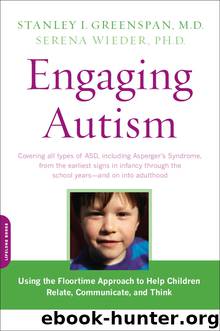Engaging Autism by Stanley I. Greenspan

Author:Stanley I. Greenspan [Greenspan, Stanley I.; Wieder, Serena]
Language: eng
Format: epub, mobi
ISBN: 9780738211374
Publisher: Da Capo Press
Peer Relationships
Another basic goal of working with adolescents and adults with autism and developmental challenges is to help improve the extent and quality of their relations to peers. Children diagnosed with Asperger’s Syndrome who are sufficiently verbal and academically skillful to be in a regular class but cannot get along appropriately with other children feel isolated and alienated. They can become very sad and depressed. They are aware enough to want to have friends and to be part of a social group, but they are also keenly aware of their lack of acceptance by others. Teenagers and adults with similar developmental disabilities may experience the same feelings.
For example, Donald, a fifteen-year-old boy, was in therapy with a psychiatrist for severe depression and withdrawal following the death of his grandfather. He had previously been seen by another therapist, who had diagnosed him with Asperger’s Syndrome and had treated him with a combination of antipsychotic and stimulant medication. According to that therapist, Donald was very difficult to engage and generally interacted with little emotion. He could speak, read, and understand language fairly well and could do his schoolwork with the support of special education classes and an individual tutor. Although he was hypersensitive to sound and touch and had low muscle tone and problems with fine and gross motor coordination, the family had not been able to obtain adequate occupational and physical therapy services for him. His new psychiatrist discovered that Donald’s greatest concerns were the loss of his grandfather and his lack of friends. For several years prior to his grandfather’s death, Donald had daily telephone conversations with his grandfather that lasted up to an hour and a half. His grandfather had in fact been attempting to fill in for the social contact that was otherwise completely lacking in Donald’s life.
The psychiatrist saw Donald weekly or semiweekly for therapy sessions and talked with him daily on the telephone for five to ten minutes. As part of these sessions, the psychiatrist offered Donald an opportunity to engage in role playing. Donald welcomed this chance. Often the psychiatrist would play the role of a highly verbal, obnoxious, and playful adolescent (the kind Donald had the most trouble with at school). The goal for the conversations was to engage Donald and to educate him in the non-verbal aspects of teenage communication, both face-to-face and on the phone. With four months of this approach, Donald’s initial, extraordinarily flat and depressed emotional tone changed. The pace, rhythm, and range of emotion in his speech improved and became closer to that of other adolescents his age. Within the next five months he began, for the first time in his life, to have some limited friendships and a girlfriend and to start work in a volunteer position at a local hospital. The psychiatrist encouraged these relationships and also lots of “practice” with real peers on a daily basis. (The topic of facilitating peer relationships in adolescents and adults with ASD is addressed in greater depth in the following chapter.
Download
This site does not store any files on its server. We only index and link to content provided by other sites. Please contact the content providers to delete copyright contents if any and email us, we'll remove relevant links or contents immediately.
Should I Stay or Should I Go? by Ramani Durvasula(7664)
Why We Sleep: Unlocking the Power of Sleep and Dreams by Matthew Walker(6708)
Fear by Osho(4733)
Flow by Mihaly Csikszentmihalyi(4694)
Rising Strong by Brene Brown(4455)
Why We Sleep by Matthew Walker(4436)
The Hacking of the American Mind by Robert H. Lustig(4379)
How to Change Your Mind by Michael Pollan(4355)
Too Much and Not the Mood by Durga Chew-Bose(4344)
Lost Connections by Johann Hari(4174)
He's Just Not That Into You by Greg Behrendt & Liz Tuccillo(3893)
Evolve Your Brain by Joe Dispenza(3676)
The Courage to Be Disliked by Ichiro Kishimi & Fumitake Koga(3497)
Crazy Is My Superpower by A.J. Mendez Brooks(3399)
In Cold Blood by Truman Capote(3380)
Resisting Happiness by Matthew Kelly(3337)
What If This Were Enough? by Heather Havrilesky(3309)
The Book of Human Emotions by Tiffany Watt Smith(3307)
Descartes' Error by Antonio Damasio(3275)
